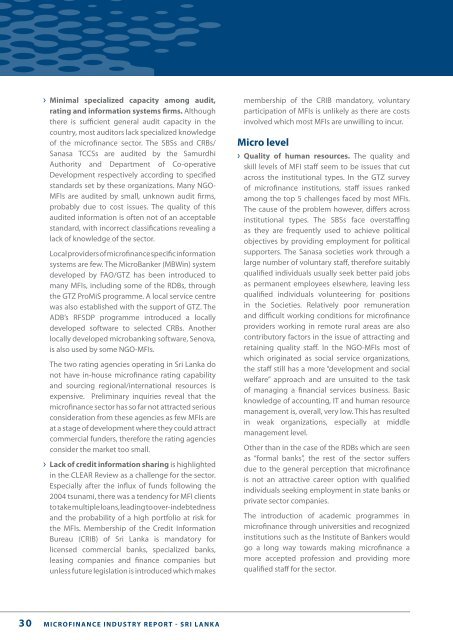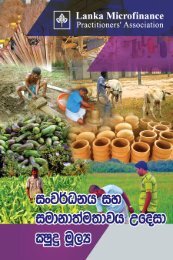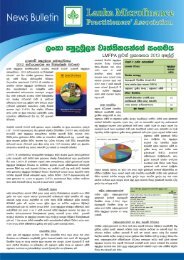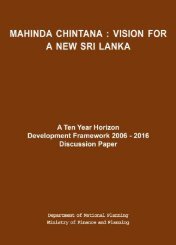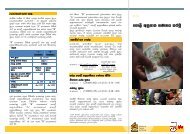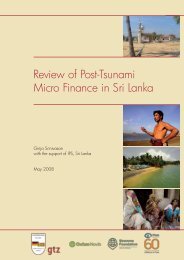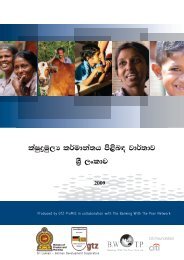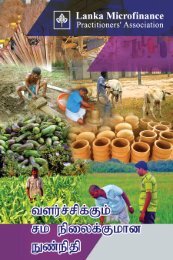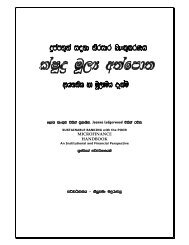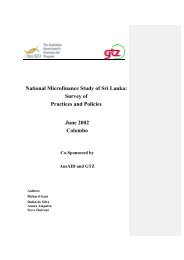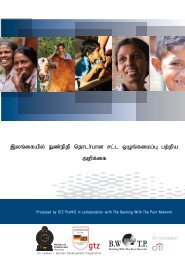Microfinance Industry Report SRI LANKA - Microfinance in Sri Lanka
Microfinance Industry Report SRI LANKA - Microfinance in Sri Lanka
Microfinance Industry Report SRI LANKA - Microfinance in Sri Lanka
You also want an ePaper? Increase the reach of your titles
YUMPU automatically turns print PDFs into web optimized ePapers that Google loves.
M<strong>in</strong>imal specialized capacity among audit,<br />
rat<strong>in</strong>g and <strong>in</strong>formation systems firms. Although<br />
there is sufficient general audit capacity <strong>in</strong> the<br />
country, most auditors lack specialized knowledge<br />
of the microf<strong>in</strong>ance sector. The SBSs and CRBs/<br />
Sanasa TCCSs are audited by the Samurdhi<br />
Authority and Department of Co-operative<br />
Development respectively accord<strong>in</strong>g to specified<br />
standards set by these organizations. Many NGO-<br />
MFIs are audited by small, unknown audit firms,<br />
probably due to cost issues. The quality of this<br />
audited <strong>in</strong>formation is often not of an acceptable<br />
standard, with <strong>in</strong>correct classifications reveal<strong>in</strong>g a<br />
lack of knowledge of the sector.<br />
Local providers of microf<strong>in</strong>ance specific <strong>in</strong>formation<br />
systems are few. The MicroBanker (MBW<strong>in</strong>) system<br />
developed by FAO/GTZ has been <strong>in</strong>troduced to<br />
many MFIs, <strong>in</strong>clud<strong>in</strong>g some of the RDBs, through<br />
the GTZ ProMiS programme. A local service centre<br />
was also established with the support of GTZ. The<br />
ADB’s RFSDP programme <strong>in</strong>troduced a locally<br />
developed software to selected CRBs. Another<br />
locally developed microbank<strong>in</strong>g software, Senova,<br />
is also used by some NGO-MFIs.<br />
The two rat<strong>in</strong>g agencies operat<strong>in</strong>g <strong>in</strong> <strong>Sri</strong> <strong>Lanka</strong> do<br />
not have <strong>in</strong>-house microf<strong>in</strong>ance rat<strong>in</strong>g capability<br />
and sourc<strong>in</strong>g regional/<strong>in</strong>ternational resources is<br />
expensive. Prelim<strong>in</strong>ary <strong>in</strong>quiries reveal that the<br />
microf<strong>in</strong>ance sector has so far not attracted serious<br />
consideration from these agencies as few MFIs are<br />
at a stage of development where they could attract<br />
commercial funders, therefore the rat<strong>in</strong>g agencies<br />
consider the market too small.<br />
> > Lack of credit <strong>in</strong>formation shar<strong>in</strong>g is highlighted<br />
<strong>in</strong> the CLEAR Review as a challenge for the sector.<br />
Especially after the <strong>in</strong>flux of funds follow<strong>in</strong>g the<br />
2004 tsunami, there was a tendency for MFI clients<br />
to take multiple loans, lead<strong>in</strong>g to over-<strong>in</strong>debtedness<br />
and the probability of a high portfolio at risk for<br />
the MFIs. Membership of the Credit Information<br />
Bureau (CRIB) of <strong>Sri</strong> <strong>Lanka</strong> is mandatory for<br />
licensed commercial banks, specialized banks,<br />
leas<strong>in</strong>g companies and f<strong>in</strong>ance companies but<br />
unless future legislation is <strong>in</strong>troduced which makes<br />
membership of the CRIB mandatory, voluntary<br />
participation of MFIs is unlikely as there are costs<br />
<strong>in</strong>volved which most MFIs are unwill<strong>in</strong>g to <strong>in</strong>cur.<br />
Micro level<br />
> > Quality of human resources. The quality and<br />
skill levels of MFI staff seem to be issues that cut<br />
across the <strong>in</strong>stitutional types. In the GTZ survey<br />
of microf<strong>in</strong>ance <strong>in</strong>stitutions, staff issues ranked<br />
among the top 5 challenges faced by most MFIs.<br />
The cause of the problem however, differs across<br />
<strong>in</strong>stitutional types. The SBSs face overstaff<strong>in</strong>g<br />
as they are frequently used to achieve political<br />
objectives by provid<strong>in</strong>g employment for political<br />
supporters. The Sanasa societies work through a<br />
large number of voluntary staff, therefore suitably<br />
qualified <strong>in</strong>dividuals usually seek better paid jobs<br />
as permanent employees elsewhere, leav<strong>in</strong>g less<br />
qualified <strong>in</strong>dividuals volunteer<strong>in</strong>g for positions<br />
<strong>in</strong> the Societies. Relatively poor remuneration<br />
and difficult work<strong>in</strong>g conditions for microf<strong>in</strong>ance<br />
providers work<strong>in</strong>g <strong>in</strong> remote rural areas are also<br />
contributory factors <strong>in</strong> the issue of attract<strong>in</strong>g and<br />
reta<strong>in</strong><strong>in</strong>g quality staff. In the NGO-MFIs most of<br />
which orig<strong>in</strong>ated as social service organizations,<br />
the staff still has a more “development and social<br />
welfare” approach and are unsuited to the task<br />
of manag<strong>in</strong>g a f<strong>in</strong>ancial services bus<strong>in</strong>ess. Basic<br />
knowledge of account<strong>in</strong>g, IT and human resource<br />
management is, overall, very low. This has resulted<br />
<strong>in</strong> weak organizations, especially at middle<br />
management level.<br />
Other than <strong>in</strong> the case of the RDBs which are seen<br />
as “formal banks”, the rest of the sector suffers<br />
due to the general perception that microf<strong>in</strong>ance<br />
is not an attractive career option with qualified<br />
<strong>in</strong>dividuals seek<strong>in</strong>g employment <strong>in</strong> state banks or<br />
private sector companies.<br />
The <strong>in</strong>troduction of academic programmes <strong>in</strong><br />
microf<strong>in</strong>ance through universities and recognized<br />
<strong>in</strong>stitutions such as the Institute of Bankers would<br />
go a long way towards mak<strong>in</strong>g microf<strong>in</strong>ance a<br />
more accepted profession and provid<strong>in</strong>g more<br />
qualified staff for the sector.<br />
30 microf<strong>in</strong>ance <strong>in</strong>dustry report - <strong>SRI</strong> <strong>LANKA</strong>


